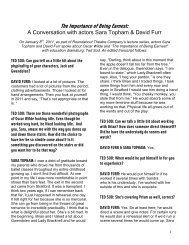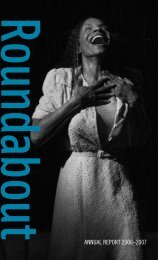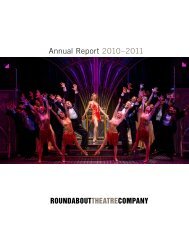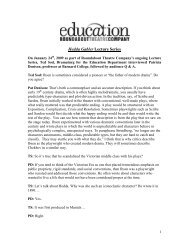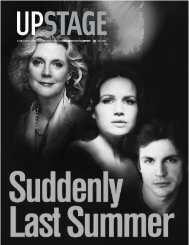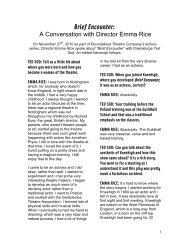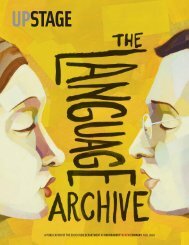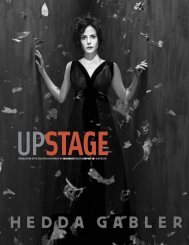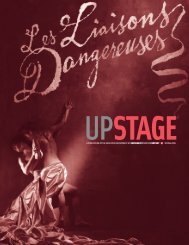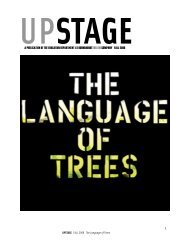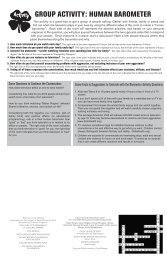The Importance of Being Earnest - Roundabout Theatre Company
The Importance of Being Earnest - Roundabout Theatre Company
The Importance of Being Earnest - Roundabout Theatre Company
You also want an ePaper? Increase the reach of your titles
YUMPU automatically turns print PDFs into web optimized ePapers that Google loves.
ROUNDABOUTTHEATRECOMPANY
<strong>The</strong> Callboard
ROUNDABOUTTHEATRECOMPANY
ROUNDABOUTTHEATRECOMPANY
UPSTAGE WINTER 2011: THE IMPORTANCE OF BEING EARNEST
UPSTAGE WINTER 2011: THE IMPORTANCE OF BEING EARNEST
UPSTAGE WINTER 2011: THE IMPORTANCE OF BEING EARNEST<br />
<br />
<br />
<br />
<br />
<br />
<br />
<br />
<br />
<br />
<br />
<br />
<br />
<br />
<br />
<br />
<br />
<br />
<br />
<br />
<br />
<br />
<br />
<br />
<br />
<br />
<br />
<br />
<br />
<br />
<br />
<br />
<br />
<br />
<br />
<br />
<br />
<br />
<br />
<br />
<br />
<br />
<br />
<br />
<br />
<br />
<br />
<br />
<br />
<br />
<br />
<br />
<br />
<br />
<br />
<br />
<br />
<br />
<br />
<br />
<br />
<br />
<br />
<br />
<br />
<br />
<br />
<br />
<br />
<br />
<br />
<br />
<br />
<br />
<br />
<br />
<br />
<br />
UP
“Always forgive your enemies. Nothing annoys them so much.”
SATIRE: Seeks public reform, improved standards, or a heightened<br />
awareness <strong>of</strong> a corrupt society. Irony, wit, exaggeration and<br />
extremes all help to raise audience awareness. Satire sometimes<br />
uses strong character types as targets <strong>of</strong> critique instead <strong>of</strong> identifying<br />
specific people. <strong>The</strong> author relies on the audience to recognize<br />
“clues” in order to understand the target <strong>of</strong> the satire.<br />
COMEDY OF MANNERS: Portrays the manners, conventions<br />
and stylized fashions <strong>of</strong> the upper classes in an artificial,<br />
sophisticated society. Romantic plots <strong>of</strong>ten turn on illicit or amoral<br />
romantic affairs. Humor is expressed through witty language,<br />
character “types” (such as fops or jealous husbands) and making fun<br />
<strong>of</strong> characters who fail to conform to the conventional attitudes and<br />
manners <strong>of</strong> an elegant society.<br />
FARCE: Broad physical comedy, built on tightly constructed<br />
plots about middle-class characters. Exaggerated situations (<strong>of</strong>ten<br />
about love, sex, and money) push characters to rush at frantic<br />
paces, slamming doors and hiding in closets. Farce builds to<br />
absurd situations, but in the end, stability <strong>of</strong> relationships and class<br />
hierarchy is restored.<br />
<br />
INVERSION: the reversal <strong>of</strong> words from their expected order in<br />
a sentence. Wilde uses inverted statements to satirize Victorian<br />
morality and society. Algernon’s remark, “Divorces are made in<br />
Heaven,” undermines the institution <strong>of</strong> marriage by inverting the<br />
popular saying that “marriages are made in heaven.” When Jack<br />
declares “It is a terrible thing for a man to find out suddenly that<br />
all his life he’s been telling nothing but the truth,” Wilde comments<br />
upon the hypocrisy <strong>of</strong> this society.<br />
EPIGRAM: a short, witty, and <strong>of</strong>ten paradoxical saying (example:<br />
“A stitch in time saves nine”). Epigrams allow Wilde to display his<br />
own mastery <strong>of</strong> language, literature, and life and to challenge the<br />
wit <strong>of</strong> his listener.<br />
<br />
<br />
<br />
<br />
<br />
<br />
<br />
<br />
<br />
<br />
<br />
<br />
<br />
<br />
<br />
<br />
<br />
<br />
<br />
<br />
<br />
<br />
<br />
<br />
<br />
<br />
<br />
<br />
<br />
<br />
<br />
<br />
<br />
<br />
<br />
<br />
<br />
<br />
<br />
<br />
<br />
<br />
<br />
<br />
<br />
<br />
WITTICISM: a clever witty and <strong>of</strong>ten biting or ironic remark.<br />
Nearly every line spoken in the play is a kind <strong>of</strong> witticism.<br />
WORDPLAY: playful use <strong>of</strong> words.<br />
“ Art is the only serious thing in the world.<br />
And the artist is the only person who is never serious.”<br />
UPSTAGE WINTER 2011: THE IMPORTANCE OF BEING EARNEST
SATIRE: Seeks public reform, improved standards, or a heightened<br />
awareness <strong>of</strong> a corrupt society. Irony, wit, exaggeration and<br />
extremes all help to raise audience awareness. Satire sometimes<br />
uses strong character types as targets <strong>of</strong> critique instead <strong>of</strong> identifying<br />
specific people. <strong>The</strong> author relies on the audience to recognize<br />
“clues” in order to understand the target <strong>of</strong> the satire.<br />
COMEDY OF MANNERS: Portrays the manners, conventions<br />
and stylized fashions <strong>of</strong> the upper classes in an artificial,<br />
sophisticated society. Romantic plots <strong>of</strong>ten turn on illicit or amoral<br />
romantic affairs. Humor is expressed through witty language,<br />
character “types” (such as fops or jealous husbands) and making fun<br />
<strong>of</strong> characters who fail to conform to the conventional attitudes and<br />
manners <strong>of</strong> an elegant society.<br />
FARCE: Broad physical comedy, built on tightly constructed<br />
plots about middle-class characters. Exaggerated situations (<strong>of</strong>ten<br />
about love, sex, and money) push characters to rush at frantic<br />
paces, slamming doors and hiding in closets. Farce builds to<br />
absurd situations, but in the end, stability <strong>of</strong> relationships and class<br />
hierarchy is restored.<br />
<br />
INVERSION: the reversal <strong>of</strong> words from their expected order in<br />
a sentence. Wilde uses inverted statements to satirize Victorian<br />
morality and society. Algernon’s remark, “Divorces are made in<br />
Heaven,” undermines the institution <strong>of</strong> marriage by inverting the<br />
popular saying that “marriages are made in heaven.” When Jack<br />
declares “It is a terrible thing for a man to find out suddenly that<br />
all his life he’s been telling nothing but the truth,” Wilde comments<br />
upon the hypocrisy <strong>of</strong> this society.<br />
EPIGRAM: a short, witty, and <strong>of</strong>ten paradoxical saying (example:<br />
“A stitch in time saves nine”). Epigrams allow Wilde to display his<br />
own mastery <strong>of</strong> language, literature, and life and to challenge the<br />
wit <strong>of</strong> his listener.<br />
<br />
<br />
<br />
<br />
<br />
<br />
<br />
<br />
<br />
<br />
<br />
<br />
<br />
<br />
<br />
<br />
<br />
<br />
<br />
<br />
<br />
<br />
<br />
<br />
<br />
<br />
<br />
<br />
<br />
<br />
<br />
<br />
<br />
<br />
<br />
<br />
<br />
<br />
<br />
<br />
<br />
<br />
<br />
<br />
<br />
<br />
WITTICISM: a clever witty and <strong>of</strong>ten biting or ironic remark.<br />
Nearly every line spoken in the play is a kind <strong>of</strong> witticism.<br />
WORDPLAY: playful use <strong>of</strong> words.<br />
“ Art is the only serious thing in the world.<br />
And the artist is the only person who is never serious.”<br />
UPSTAGE WINTER 2011: THE IMPORTANCE OF BEING EARNEST
“ Do not speak ill <strong>of</strong> society, Algie.<br />
Only people who can't get in do that.”<br />
UPSTAGE WINTER 2011: THE IMPORTANCE OF BEING EARNEST
Upper Class<br />
All women were expected<br />
to maintain the home and<br />
carry on the family line,<br />
but after the childbirth,<br />
wealthy women could still<br />
enjoy a leisurely lifestyle.<br />
With inheritances or their<br />
husband’s income, they<br />
could take control over<br />
a portion <strong>of</strong> the family’s<br />
financial resources to<br />
hire governesses and<br />
servants to take care <strong>of</strong><br />
their homes while they<br />
spent time elsewhere. It<br />
became a status symbol<br />
for a man when his wife<br />
was able to spend her<br />
time appreciating the arts<br />
and socializing.<br />
Lower Class<br />
Husband and wives<br />
worked more as a team<br />
to maintain farmlands<br />
but remained segregated<br />
in defined roles. Women<br />
and girls carried out<br />
housework and prepared<br />
meals. Like the aristocratic<br />
women, middle<br />
and working class women<br />
had control over some<br />
financial matters in the<br />
family. <strong>The</strong>y would sell<br />
items at the markets in<br />
order to gain money to<br />
buy goods needed for the<br />
household.<br />
<br />
“ <strong>The</strong> amount <strong>of</strong> women in London who flirt with their<br />
own husbands is perfectly scandalous.”
“ A man who desires to get married should<br />
know either everything or nothing.”<br />
<br />
<br />
Upper Class<br />
<strong>The</strong> aristocratic gentleman<br />
generally was associated<br />
with government,<br />
law, higher education<br />
and business but he was<br />
expected to also be familiar<br />
with art, poetry and<br />
literature. Dueling and<br />
sports were also a part <strong>of</strong><br />
maintaining the appearance<br />
and lifestyle <strong>of</strong> an<br />
aristocrat. Gentlemen<br />
were largely considered<br />
aristocratic and respectable<br />
by the occupation<br />
they held.<br />
Lower Class<br />
While the women carried<br />
out housework on<br />
the farm, men and boys<br />
worked in the fields and<br />
cared for farm animals.<br />
<strong>The</strong> lower class also included<br />
a class <strong>of</strong> factory<br />
workers who labored for<br />
long hours and low wages.<br />
<strong>The</strong> sons <strong>of</strong> factory workers<br />
could expect either to<br />
take over their fathers'<br />
jobs or work beside them<br />
in the mill.<br />
UPSTAGE WINTER 2011: THE IMPORTANCE OF BEING EARNEST
“ A man who desires to get married should<br />
know either everything or nothing.”<br />
<br />
<br />
Upper Class<br />
<strong>The</strong> aristocratic gentleman<br />
generally was associated<br />
with government,<br />
law, higher education<br />
and business but he was<br />
expected to also be familiar<br />
with art, poetry and<br />
literature. Dueling and<br />
sports were also a part <strong>of</strong><br />
maintaining the appearance<br />
and lifestyle <strong>of</strong> an<br />
aristocrat. Gentlemen<br />
were largely considered<br />
aristocratic and respectable<br />
by the occupation<br />
they held.<br />
Lower Class<br />
While the women carried<br />
out housework on<br />
the farm, men and boys<br />
worked in the fields and<br />
cared for farm animals.<br />
<strong>The</strong> lower class also included<br />
a class <strong>of</strong> factory<br />
workers who labored for<br />
long hours and low wages.<br />
<strong>The</strong> sons <strong>of</strong> factory workers<br />
could expect either to<br />
take over their fathers'<br />
jobs or work beside them<br />
in the mill.<br />
UPSTAGE WINTER 2011: THE IMPORTANCE OF BEING EARNEST
UPSTAGE WINTER 2011: THE IMPORTANCE OF BEING EARNEST
UP<br />
UPSTAGE WINTER 2011: THE IMPORTANCE OF BEING EARNEST
UP<br />
UPSTAGE WINTER 2011: THE IMPORTANCE OF BEING EARNEST
UPSTAGE WINTER 2011: THE IMPORTANCE OF BEING EARNEST
UPSTAGE WINTER 2011: THE IMPORTANCE OF BEING EARNEST
UPSTAGE WINTER 2011: THE IMPORTANCE OF BEING EARNEST
UPSTAGE WINTER 2011: THE IMPORTANCE OF BEING EARNEST
UPSTAGE WINTER 2011: THE IMPORTANCE OF BEING EARNEST
UPSTAGE WINTER 2011: THE IMPORTANCE OF BEING EARNEST



